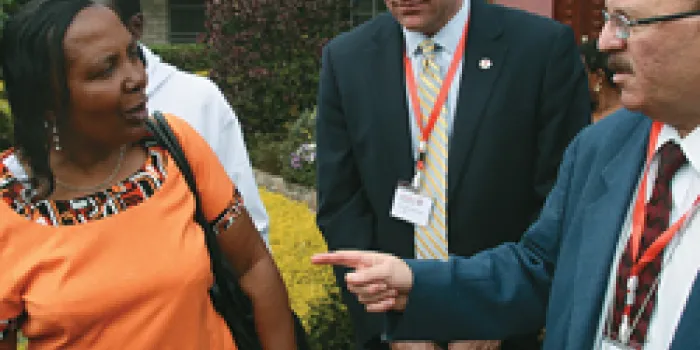Cecilia Wambui Mwangi, of Nairobi, Kenya, understands the misperceptions and challenges of obtaining accurate information and treatment for people with hemophilia in a developing country. Her son, Steve, 23, has hemophilia. “Many parents think hemophilia is a family curse, so they lock the child in the house,” she says.
Despite being the second most populous continent, Africa is the most underrepresented geographical area within the World Federation of Hemophilia (WFH). WFH faces many challenges related to access to care and treatment as it tries to raise awareness among the 1 billion people in 53 countries across the continent. Only one-third of African nations have a national member organization (NMO) within the WFH membership, leaving thousands unrepresented, undiagnosed and unable to access treatment and care.
“Integral to the approach to achieving treatment for all is building a core center of expertise within each African region to serve as a hub for further development, as well as regional role models,” says WFH President Mark Skinner.
WFH experience has shown that culturally appropriate training in a setting that resembles the country’s level of care facilitates longer-lasting knowledge and a greater chance of achieving sustainable care. Regional training workshops and the WFH’s Twinning Program, for example, maximize these opportunities. The Twinning Program has proven successful at introducing care and building the core of medical expertise within countries. This is achieved by linking teams from two geographically remote NMOs or hemophilia treatment centers, typically from a developed and developing country, to share skills and experience.
Educating Yourself to Educate Others
For Cecilia, gaining knowledge of hemophilia through the Kenya Haemophilia Association in Nairobi, her NMO, has greatly improved her son’s situation. Last year when Steve broke both legs and bled profusely after a traffic accident, he was taken to a regional clinic. The medical staff had no understanding of hemophilia or how to treat it. Because Steve was able to explain hemophilia to medical providers, they took the proper precautions to control his bleeding. His mother then took him to a hospital to receive factor concentrates.
“Knowing about hemophilia saved his life,” Cecilia says. At Kenyatta National Hospital, doctors treated the bleeds with factor donated through the WFH’s Humanitarian Aid Program. “Many Kenyans are very poor and would not be able to make the payments for factor, but when they are given factor at Kenyatta National Hospital by the WFH, they don’t pay a cent,” Cecilia says. It is difficult to obtain factor for patients in Kenya, she says, because hemophilia is not a well-known condition. “It’s not like malaria, where people get money from the government. The newspapers and TV talk about AIDS, malaria and tuberculosis, but not hemophilia, so we need the WFH’s help.”
A priority of the WFH in Africa is to improve diagnosis through regional laboratory training workshops and by encouraging the development of national patient registries. To date, five sub-Saharan African countries have patient registries. The next step is to improve knowledge of the multidisciplinary approach to hemophilia through training programs in areas such as physical therapy and orthopedics.

